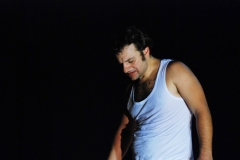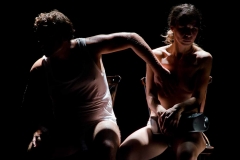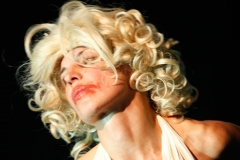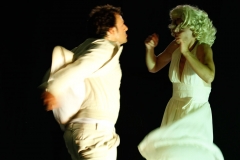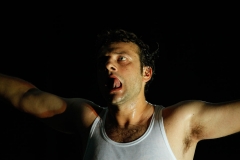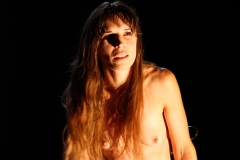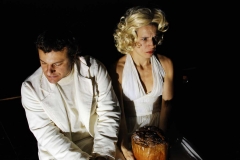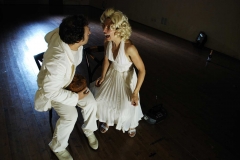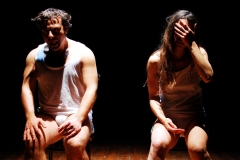
Fucking cruel world
by Francesca Macrì and Andrea Trapani
direction Francesca Macrì
cast Aida Talliente and Andrea Trapani
light designer Luigi Biondi
production Biancofango – La Corte Ospitale – Officina 1011
production year 2012
A man. A woman. A couple. A room. A month. December. One night.
The Christmas one.
The snow that covers everything and erases everything. The dawn that catches the darkness in advance, reveals obscene desires, consumes the thoughts, upsets the souls, leads to attrition.
Here they are. The rebel spouses. The exhausted lovers.
Here they are. The survivor and the executioner. The meeting of opposites.
Nothing satisfies them. Nothing satiates them.
But where you can run away while you meet halfway?
This man and this woman have no names. They could be called in any way. In spite of themselves, in spite of ourselves, they hide something ancestral, atavistic.
They have no names and this man and this woman will never have them throughout the show. Sometimes it is no longer enough to be as you are. And to say things that, perhaps, otherwise they would remain clenched in the throat, she clumsily dresses like Marilyn Monroe.
No name, therefore, and, apparently, a house that could be anywhere.
Everywhere, in this damn world of suburbs. A window, like in a Hopper painting, divides the spaces. There you look, there you wait. The place of emptiness and dream, of trepidation and silence. Of thought. Inside, out. Out, inside. You are never truly where you are.
The eyes glimpse, besides the glass, a causeway, the tram tracks and houses, houses, houses. Houses everywhere.
We seem to see the windows of these houses lightened. Christmas lights confuse the eyes. Hot inside and cold outside. And it is unknown how true the one is and how fake is the other.
Locked up in this room-cage-grave, this cheap Marilyn celebrates the Christmas party for her man. She organized everything or maybe she just follows the instinct of one night. A night without grace. You can’t know.
He follows her because he couldn’t do anything else.
He follows her because he’s the first of the inhabitants of this damn world, of this bloody city. Blinded by desires and by sense of guilt that blend with extraordinary speeds, he discovers, on his skin, that sometimes loving means devouring.
Flesh is blood, it is said. And the blood goes to someone’s head, specially it goes to bride’s head who, without thyrsus, in this breakup of the new millennium beginning think that many things are possible, but only one necessary.
And so here she comes, the exhausted bacchant, the broken doll, this foolish flesh in search of impious flesh, dragging this man down, down and down. And he’s there and he’s not there. He’s there but would like to be elsewhere. he is there but thinks of something else.
When we leave the theatre, we can imagine them in the centre of that room, without doors, without ways out. And you really don’t understand who is most alive and who is most dead.
After so much roaring, finally, the silence. The snow is falling. Nobody seems to have noticed anything. We look at them from afar and think: how fierce, how blinding is the sensuality of desperate lives.
https://www.youtube.com/watch?v=e14n37VIBGk&feature=youtu.be
Proof of intelligence and expressive maturity is “Damn World” of Biancofango, an apologue on the violence of the inner desires of a man and a woman to the horror of paedophilia.
Anna Bandettini, la repubblica
The two actors are really good. (…) The malaise that Macrì-Trapani-Talliente interpret is so widespread and it is expressed in such an obsessive way as to slowly lead the theatre – which is one of the trenches arranged against the immaterial – on the border of self-expression. This is understood, as everyone knows, with increasing intensity in the muddy (this is the right adjective) and white (even more just) world of the net. We can be touched by what we see of those young people who have come out of the “damn world”.
Franco Cordelli, Corriere della Sera
It is certainly not the present that Italian theatre is missing, indeed sometimes you got the feeling that there is too much of it. It was recently seen at the Teatri di Vetro review, the showcase of the independent theatre that yearly takes place at the Palladium theatre in Rome: in two evenings, three different shows seemed to have the power to recap what are the more consolidated poetics of our scene. To recap without consuming them, obviously, but above all without simplifying them. There is a dramaturgical return, but, as the latest work by the Biancofango company, Damn world has shown, it is not disjointed from a search on actor expression: so, if the word returns, it does by passing under the axes of the stage and not above. (…) Three shows, three companies, three different ways of doing and thinking about the theatre that would certainly deserve to enter in the future, if only around them someone was building It.
Attilio Scarpellini, Quaderni del Teatro di Roma/Editoriale Estate
Therefore we’re on the borders of a theatrical, lyrical and at the same time rough expressionism, of a sensitive artistic maturity whi ch, already well defined during the long preparatory workshop for the show, here it clearly aims at the caricatured grimace, the parody, the exasperation of the situation and characters. The result is – and it could not be in a different way – a poem of opposites, full of pains knotted inside, of deadened sobs, of clumsy attempts to like each other (again), of desire (denied), of celebration (the story happens on the Christmas ‘Eve), of speeches which have been postponed too many times. A poem of opposites, even comic sometimes, where the energy of the bodies allows words or silences to emerge. The two excellent actors speak, indeed, even when they’re in silence.
Laura Novelli, Paneacqua
In a crescendo of grotesque, damn world of the young company Biancofango recalls the metropolitan marginalities dear to Danio Manfredini, made hunchbacked by a life flowing inexorably. Excellent on stage Andrea Trapani and Aida Talliente directed with a very skilful hand by Francesca Macrì.
Andrea Porcheddu, Linkiesta
A harsh and true show, insight into a couple’s story stuck, like so many, in a routine with such disturbing implications that it reaches the audience like a slap hurting and giving you pause for though. Long, well-deserved and warm the final applauses.
Mario Brandolin, Messaggero – Giornale del Friuli
The work made by Francesca Macrì, Andrea Trapani and Aida Talliente in Damn World, the new show by the Biancofango company, is so accurate to be tremendous. The beautiful text is metamorphosed into the elements of a minimal, electric scene. (…) The softness of the province is planted sideways in the dirty and damned corners of this house inhabited by two suffering souls. Like flies, like stray dogs, like remains of human beings, this man and this woman humble themselves in the heavy rhythm of the hours that never pass.
Katia Ippaso, Altri
(…) Here then the dark part of the soul, willing to gather in the hours prepared for this, settles in solitude all the restless and ferocious grief of an unsatisfied existence, takes on a sweaty and discharged malaise that has no way out to despair. The new performance of Biancofango eats this exhausted feeling, it doesn’t scream, but softly holds in its throat the swallowed scream, the over and over again repressed blasphemy of this damn world. A space that at first glance would appear to be half-empty, is actually scattered of sorrowful frictions between them, that are immediately evident, with two chairs of which you feel the cold of the seat, the inconvenience, as well as their sweat, flowsz on the body of those who assist with symptoms of a rampant disease, noticeable by anyone who has experienced in extenuation and regret.
Simone Nebbia, TeatroeCritica
Damn world offers us without frills a bleak and asphyxiated landscape, where however this maelstrom of feelings and pain drowns in white rather than black. White are the clothes of the performers, white are the petticoats, white is the stage light cut down to the bone that makes one think of an open, airy world and consequently screeches with the well open by words and human events. So, white is the mud, to paraphrase the name of this young company – and it is a manifesto-name as it is also evident from their previous works. (…) Great is the scenic force and the energy of these two extraordinary actors, able to keep alive this red-hot matter which, otherwise, could easily be pitiful. Here, the pathos. And the drama. Damn world recovers both of them without ever slipping (and it was really difficult) into easy rhetoric. Demonstrating how the actor’s work is, above all, to ferry the ghosts of the stories into the live world of the audience, to take them shape, and soul.
Graziano Graziani, Quaderni del Teatro di Roma/Estate
Biancofango from Rome take its time. They don’t crank out everything passing through their heads. They think about it, elaborate it, chisel it. In a mature path that increasingly plays with a “je ne sais quoi” of dance-theatre, the central body as much as the word (very rare: to be protected like pandas), the influences to overlap and intertwine. And then Mozart and the drum’n’bass, the cultured quote and Fabri Fibra (twice), a grotesque performing taste and the time of the monologues. (…) And then writing. Very recognizable, of interlayers and repetitions, more thought than dialogue, reiteration as an aesthetic and semantic form. (…) Damn world absolutely gets to the core. And not just because of the hands frozen by the anxiety. With staggering authenticity to mark a line of research between gesture and dramaturgy, which would deserve greater attention.
Diego Vincenti, Hystrio
Outside the cold of Christmas, inside the cold of emptiness. It’s like hearing the cracks of their speeches, the roar of boredom of being together, of spending more time in a shared and narrow space. (…) The Christmas cake, devoured with bulimic bites and destroyed and vomited along with offenses, accusations and insults, is the picture of this contemporary Italian family. The crumbs on the ground like the unshed tears, now infected, the despair that can be cut into slices. (…) They are defeated, depressed, nasty, they blame themselves for their non-choices, for their current situation. The contrast between the white of the clothes and the snow they evoke and all the black they have inside. There is no salvation for affectivity. No man is an island.
Tommaso Chimenti, corrierenazionale.it
The bare scene, just made up of two not communicating bodies, opens and closes in a state of detachment, in a mature condition of parallelisms. A man more material, more childish, more superficial isolates himself in his world of erotic fantasies without the chance of fulfilment and joins a woman who struggles in tragic and ironic attempts to capture the attention of a man who’s no longer there, whose she can see the body, but can’t perceive his soul. (…) Francesca Macrì and Andrea Trapani therefore show, without pity and without hypocritical romanticisms, the intimate mechanisms of a couple by analysing them with intelligence and irony, writing a delicate and deep essay on incommunicability. A call to the need of courage to stop when there is nothing more to say.
Claudia Quaglieri, Recensito
The wise direction of Francesca Macrì, author of the text with Andrea Trapani, is cruel because profoundly true and tells the story of a couple’s exhausting fit. They can’t do without each other because the delirium of one feeds and supports the paranoia of the other. Deeply and humanly unhappy, ancestrally unable of true sharing, weakly sucked into the vortex of an oppressive, disappointing, inconsistent bond, they are two. Their union is strong. Of a desperate and unsettling force, of a furious sensuality.
Valentina Carrabino, Teatroteatro.it
About the show directed by Francesca Macrì for the action of Andrea Trapani and Aida Talliente other lines spoke in depth, photographing both the aesthetic and methodological power, and above all the hateful and visceral annoyance that takes you in the stomach, listening to those bodies contracting into a material to which they never seem to belong. (…) On stage, a man and woman immersed in continuous action, struggling with the aging of the few objects on stage. Everything is extremely “staged”. Yet there is a virus piercing the fourth wall. Suddenly, you stop listening to the meaning of the words you hear because this is all in the diaphragm trembling to make sounds. It’s the one of the actor, but it’s also yours. If you squeeze the arm of those around you, it is not really to surprise you, in a whispered voice, how good the two on stage are, but to prevent that impulse to vomit expresses itself in a totally embarrassed silence, that twisting of the bowels that would leave you there, in the freezing cold of your spectator condition.
Sergio Lo Gatto, TeatroeCritica
The director Francesca Macrì and the actors on stage create a well-finished to the very last detail work, full of nuances that make Damn world a treasure chest of a precious manufacture, which keeps stuck to the chair, makes you laugh, amazes and disturbs for a lascivious attrition, not leading to a solution, but to an inner and slow death that ends with a painful and poignant image of a defeat that absorbs man.
Carlotta Tringali, Il tamburo di Kattrin
Damn world talks about love and other iniquities: a picture of a human cross-section in the Brianza land, between small perversions and chilling habits, of a couple at the umpteenth clash, revealed in the act of self-destruction. She, a little wife over the top, imitating Marilyn to save the salvable; he who pours out his boredom in the web paedophilia. In a crescendo of grotesque, damn world of the young company Biancofango recalls the metropolitan marginalities dear to Danio Manfredini, made hunchbacked by a life flowing inexorably. Excellent on stage Andrea Trapani and Aida Talliente directed with a very skilful hand by Francesca Macrì.
Andrea Porcheddu, Linkiesta



